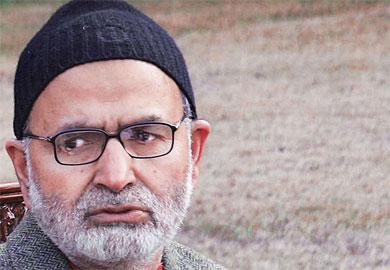By Manzoor-ul-Hassan
28/10/2015

Naeem Akhtar, Minister for Education, Jammu & Kashmir
The internationally acclaimed Sufi scholars Tuesday resolved to counter religious and political hatred through universal brotherhood and the spirit of Sufism.
“In today’s world people are facing the challenge of religious intolerance, which has led to emergence of conflicts and terrorism. It has eroded the values of tolerance, communal harmony and brotherhood. So, we must stand up and spread the concept of universal brotherhood through Sufism,” speakers said at at the concluding day of the International Symposium on Reshi-Sufi traditions of Kashmir organized by Indian Center for Cultural Relations (ICCR) in association with Center for Central Asian Studies (CCAS) University of Kashmir and Jammu and Kashmir Academy of Art, Culture and Languages, here.
In the closing session, Minister for Education, Naeem Akhtar, while addressing the gathering of Sufi scholars and students, expressed serious concern over the increasing fanaticism among various communities.
“It is unfortunate that killing a man is no big issue in India but killing an animal has become a national issue. This mentality should change once for all. This will help us to live in peace with each other,” he said.
Asserting that sufism was solution for every such problem faced by the people today, Akhtar said, “If we look at the Sufism concept, it is based on secularism and humanity. So we should raise mass awareness about the ideology and popularize the concept among masses instead of Secularism”.
Describing Kashmir as an abode of Sufism, he said the influence of Sufism transformed Kashmiri society into a global brand of pluralism and tolerance.
“Sufi is not a concept of the dead. It is a concept of living, thriving societies, and that is the kind of transformation Kashmir is continuing to live with,” he said.
Recalling the influence of scholars and craftsmen from Central Asia on the cultural landscape of Kashmir, Akhtar said motive of Islam has not been to convert non-Muslims but to live in peace and harmony with other communities.
“Sufis introduced contemporary knowledge and industry in Kashmir and made us what we are today,” he said adding it is important that “we do some self introspection and imbibe the true essence of Sufism that brought us peace and tranquility within our hearts and within the society.”
Vice-Chancellor, Kashmir University, Prof Khurshid Iqbal Andrabi also spoke in the symposium.
“Sufism has been derived from the basic fundamental of Islam called submission and surrender of ego,” he said.
Andrabi said the concept had a global appeal due to its values and concept of brotherhood.
Many young scholars including one from Kokernag Mir Mukhtar Ahmad were also present on the occasion.
Earlier, the program started with a theme presentation by Prof Naseem Ahmad Shah, who also moderated the session. It was followed by Ali Zahiri Tousi’s Sufism and its Cultural Manifestations, Sultan Shahin’s India and its Vibrant Sufi Connect and Prof Hameed Naseem Rafiabadi’s How do we Preserve and Promote the Values Enshrined in Reshi-Sufi way.
In the closing session, Prof Golam Dastagir of Bangladesh presented his paper “The Sufi Answers to Modern Day Strife Worldwide” while Syed Salman Chishty of Ajmer Sharief deliberated on “Sufism over the Millennia and its Presence and Influence in Modern India” and Prof Muhammad Ashraf Wani gave a historic perspective about syncretic values as enshrined in the Reshi-Sufi traditions of Kashmir. The proceeding of the closing session was moderated by Prof Gulshan Majeed.
Later, Director CCAS, Prof G N Khaki presented the overview of the 3-day symposium and sought support from the participants to carry forward the mission of Sufis to the world.
Regional Director ICCR, Prof Ayaz Rasool Nazki expressed gratitude to participants and support extended by academicians, students and media for the successful conduct of the event.
The symposium was coordinated by Kaamna Prasad and Aparna Reddy for ICCR while CCAS staff helped them to execute the event. (muhassan@risingkashmi.com)
Source: risingkashmir.in/news/india-should-replace-secularism-with-sufism-akhtar/




 Moderate Islamist here
Moderate Islamist here


0 comments:
Post a Comment